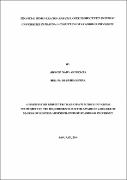| dc.description.abstract | The study sought to establish the effect of financial remuneration on employee productivity at
Kyambogo University. The study adopted a cross sectional survey design from which a
population of 522 from which a sample of 307 was drawn. A self-administered questionnaire
and an interview guide were used to collect responses. Measurement of the variables of the
study were done and subjected to rigorous data processing and analysis using the relevant
statistical computer software packages. The findings on financial remuneration indicated that
most staff members were employed elsewhere to supplement their incomes from the
University, were unable to develop themselves out of the salaries they earned from the
university, staff were unhappy with the way they were remunerated by the university and
therefore, felt that they needed to spend their valuable time elsewhere. The findings on
employee productivity revealed that, staff members lectured what they knew best, were
always available to supervise students allocated to them much as administrators in charge of
registration for instance did not perform their tasks as expected sighting delays in registering
students even when all the schools dues had been cleared by the students, on the other hand,
there was regular cases of students' marks missing. Findings indicated that there were positive
and significant relationships between financial remuneration and employee productivity.
Results from regression analysis findings revealed that the model could only explain 54.5% in
variance of employee productivity. In conclusion, the findings revealed that financial
remuneration was significant predictors of employee productivity. This is in confirmation that
financial remuneration is a key determinant of employee productivity of the university. The
study recommends that the management of the university should develop strategies that foster
employee productivity with emphasis on financial remuneration. Likewise, the management
should put a lot of attention on financial remuneration as a determinant of employee
productivity since it was the strongest predictor of employee productivity. Similarly, in order
to promote desirable employee productivity, the university needs to put in place effective
internal controls that support financial remuneration. | en_US |

